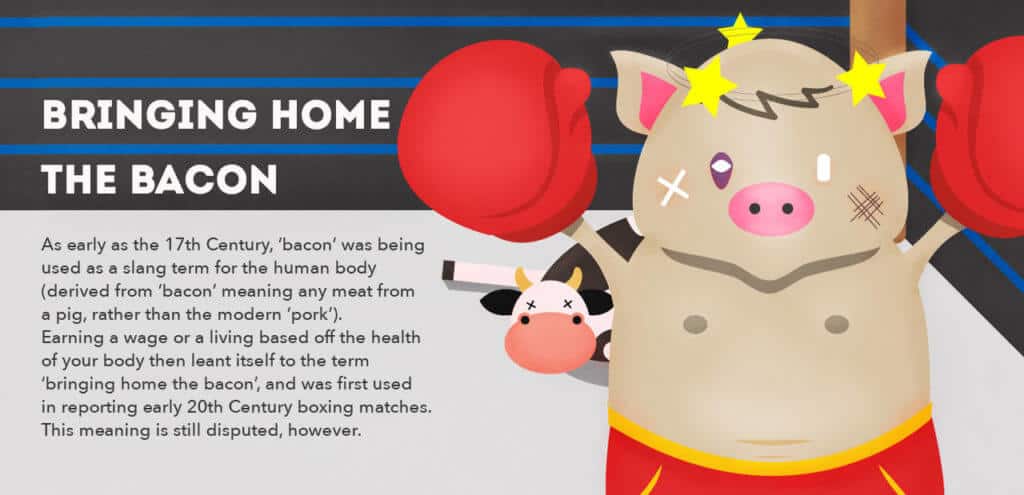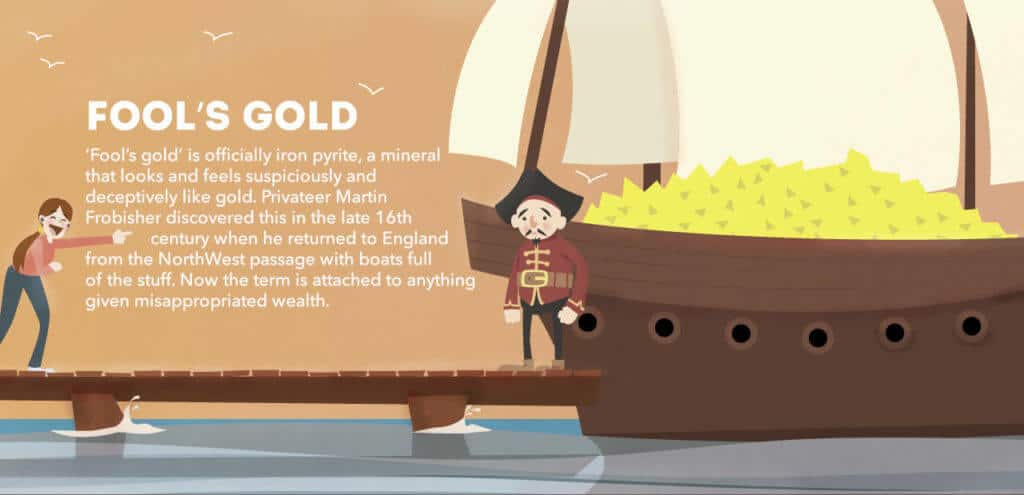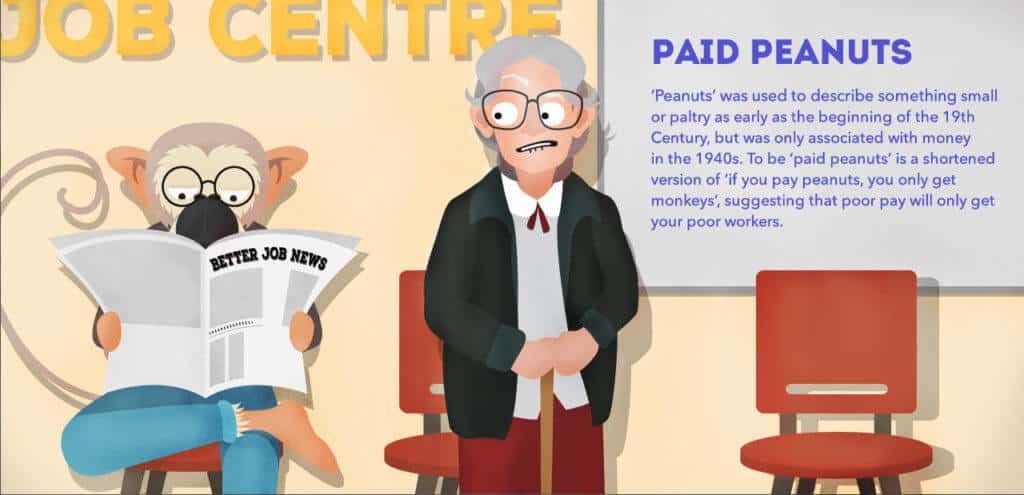This information is from Vouchercloud, a provider of deals, offers and discount codes from leading UK retailers to local businesses.
Bringing Home the Bacon
Definition: Working and earning money for their family; typically the sole or primary earner.
Origin: United Kingdom/United States, 1100s/1500s/1900s
Despite being such a wonderful phrase, the origins of the term “Bringing Home the Bacon” are still disputed.
The most commonly received explanation of where “bringing home the bacon” comes from builds upon ‘bacon’ being a slang term for one’s body. Associating your ability to earn money and make a living with the health of your body led to ‘bacon’ gaining that connotation too. Boxing was a great example of earning a living using your body, and the most frequently documented uses of the phrase come out of the sport of boxing throughout the early 20th Century.
Others believe that 12th Century England holds the truth, with the town of Great Dunmow in Essex hosting an annual competition where a ‘flitch’ of bacon would be offered to married couples who evidenced true marital devotion. Any man who showed he had not argued with his wife for a year and a day would, literally, bring home the bacon, in honour of a local couple who inspired the tradition years before – with a display of marital prowess to the mayor so wonderful, it truly deserved a meaty reward.
Alternately, some believe that the origins of ‘Bringing Home the Bacon’ belong to the 1500s, with country fairs across England hosting a traditional ‘greased pig’ competition. Long story short, this involved chasing wildly after a greased pig, with the winner being able to keep the slippery swine. That’s a whole lot of bacon to bring home.

Feel the Pinch
Definition: To be under financial hardship.
Origin: United Kingdom, 1400s
A la a pincer, to be “in a pinch” literally means to feel the squeeze – or feel under (financial) pressure.
The word ‘pinch’ was increasingly associated with money in the 14th Century, when ‘to pinch’ became a slang term for stealing, or simply being a bit stingy (to ‘pinch pennies’).
Fool’s Gold
Definition: something mistakenly believed to be full of potential or potential reward.
Origin: United Kingdom/United States, 1800s
“Fool’s Gold” is the name given to iron pyrites, which look a bit like gold but are worth little-to-nothing – as explorer Martin Frobisher discovered in the late 1500s when he returned to England from the North-West passage with a lot of the stuff.
The origins of the term “fool’s gold’ grew out of this, becoming a term used to describe anything inappropriately assigned a great value.

Going Dutch
Definition: to split evenly, most commonly used when settling a bill.
Origin: United Kingdom, 1600s
In the 17th Century (when Holland and Great Britain weren’t the best of friends) the Dutch were mocked for being stingy or ungenerous.
Therefore, as opposed to being chivalrous men and paying for a meal, the Dutch would allow the lady to pay her share when on a date or going for a meal, otherwise known as “going Dutch”.
So, to summarise, the origins of “going Dutch” grew out of casual racism.
A Grand
Definition: A slang/colloquial term for one thousand pounds or dollars.
Origin: United States, 1900s
One thousand of anything is a pretty wonderful amount. In fact, the origins of “a grand” referring to one thousand pounds or dollars simply grew out of referring to it as a ‘grand amount of money’.
The term grew into British use during WWII, where it was even abbreviated to a ‘G’ or ‘G-note’.
Grease Someone’s Palm
Definition: to offer a bribe, or an incentive (often underhanded, or sneaky).
Origin: United Kingdom, 1920s
Offering a sneaky bribe or incentivising someone with money will often be done to ensure that everything goes to plan.
The origin of “grease someone’s palm” is akin to this, simply suggesting that, similar to oiling up or greasing mechanical parts of machine, putting some money forward will ensure everything runs smoothly – so to speak.
My Two Cents
Definition: Opinion, or piece of advice, that might be unwelcome or unasked for
Origin: United States, 1920s
The origin of giving your “Two Cents’ Worth” are assumed to be the same as the British counterpart, giving your “Tuppence Worth”/Two pennies’ Worth”)
Alternately, giving your “two cents worth” could come from betting in games such as poker, where you have to pay an ante before beginning play – once said to be two cents (though this detaches the meaning from its British equivalent of “two pennies’ worth”)
Nest Egg
Definition: an (large) amount of money saved for the future; often life savings.
Origin: United Kingdom/United States, 1600s
A ‘nest egg’ or ‘nest-egg’ is a fake ceramic (or sometimes real) egg added into a hen’s nest to encourage her to lay.
Although the connection is not completely clear, the origins of the modern term “nest egg” – meaning a sum of money tucked away in savings or for retirement – is said to have grown out of the assurance that a ‘nest egg’ would yield extra eggs for a farmer, meaning more money.
Using ‘nest egg’ to refer to a sum of money seemingly dates back to 1686, despite the use of nest eggs in chicken coops dating back to the 14th Century.
Paid Peanuts
Definition: to be paid very little; practically nothing.
Origin: United Kingdom, 1940s
‘Peanuts’ was always a term used for something small or paltry (since 1840, in fact), but only came to be used as a financial term in the 1940s.
Essentially, peanuts are one of the smallest things that still derive any value – and ‘if you pay peanuts, you only get monkeys’ became a phrase that suggested that poor pay would only ever get you poor workers.

A Pretty Penny
Definition: a large or considerable amount of money.
Origin: United Kingdom, 1900s
The origins of “a pretty penny” are thought to hark back to the 13th Century, and special gold pennies coined by Henry III.
These special 1257 gold pennies – worth the equivalent of 20 silver pennies – were deemed, appropriately, to be the prettier of the two, given their far greater worth.









